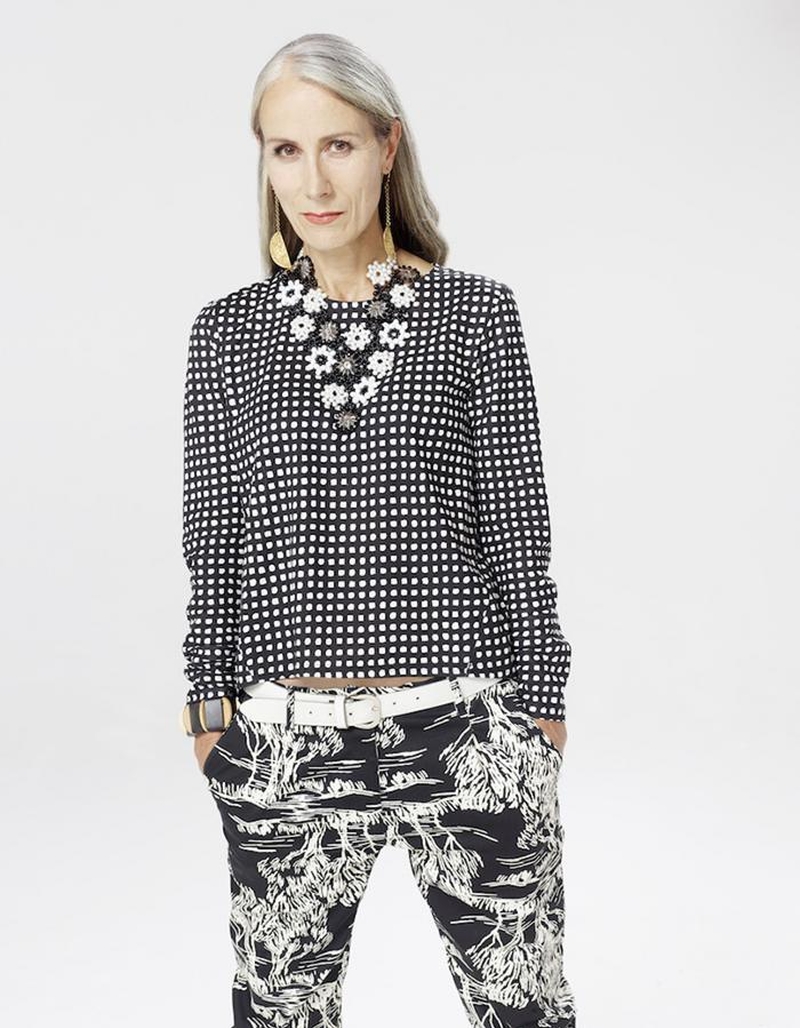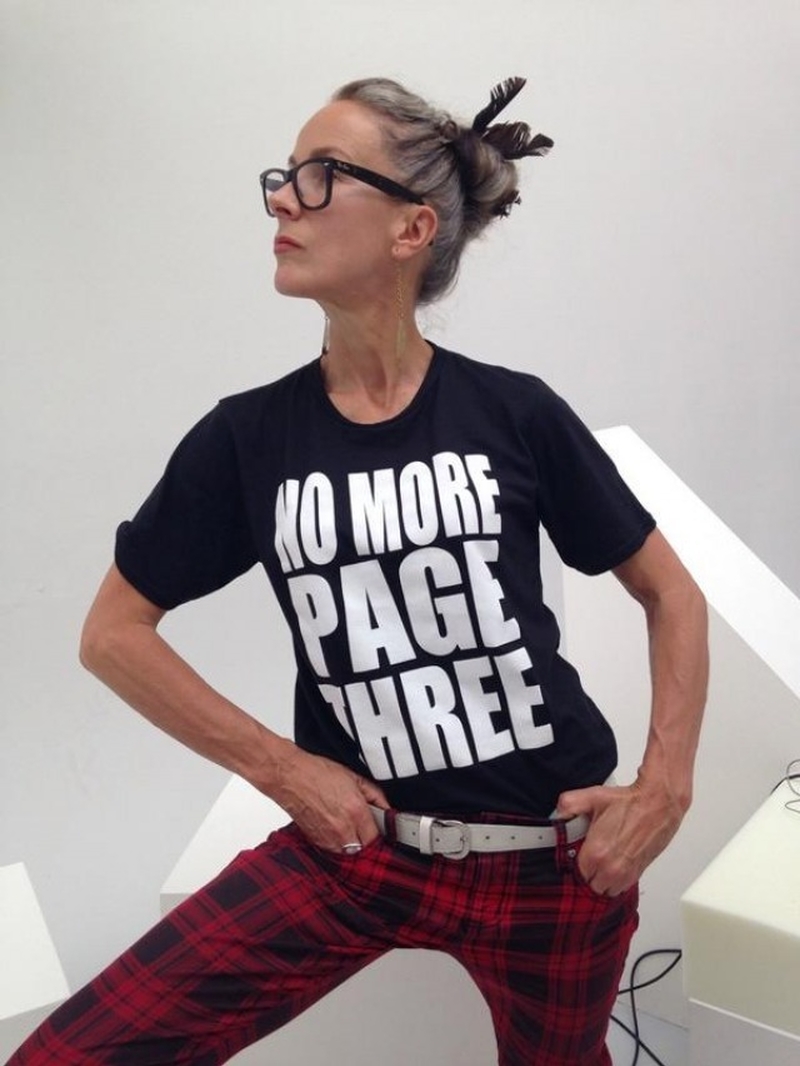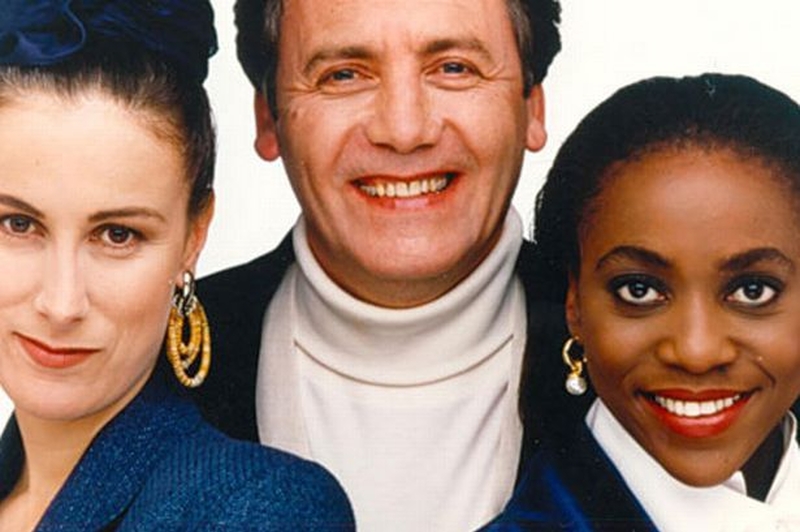L'Oréal Blackett talks McQueen, diversity and bold prints with The Clothes Show's original host
Here’s an iconic moment in The Clothes Show’s rich three-decade history.
In 1988, I.D fashion editor Caryn Franklin interviews the late designer and club-kid icon Leigh Bowery in Harrods on BBC One prime time television. Naturally, Bowery wore his famed ‘fabric face’ masks and matching zany dresses for afternoon tea in the Georgian restaurant.
“I’m sporting a rather angular, geometric, rather aggressive print today with a few thousand sequins scattered across it,” he giggled before sashaying down a beige eighties tearoom – much to the confusion of the Harrods clientele.
From the catwalks to interviews with eccentric fashion mavericks, Britain’s first fashion-focused TV program was ground-breaking for all the right reasons.
“Since The Clothes Show began 28 years ago, we saw how much excitement it brought to ordinary people who wanted to know more about fashion,” shares Franklin, one of the show’s original presenters alongside designer Jeff Banks.
“The audience said ‘we hear of the Paris catwalks and London fashion week, but where can we see a fashion show? We’re very interested in the fashion industry, we want to learn more’. The Clothes Show helped to open the doors to people who wouldn’t normally be a part of the workings of fashion.”

After twelve years on air and a collective 27 years at the Birmingham NEC, the Clothes Show makes it way to Liverpool as The British Style Collective this weekend (7 – 9 July). Caryn Franklin is still at the helm of the show, and this year will help different voices in the fashion industry tell their unique stories on various panels at St George’s Hall.
“I’m particularly looking forward to helping Gary James McQueen tell his story,” she muses.
“He is the next generation, from what I would say is fashion royalty – Alexander McQueen was his uncle and saw in him a talent and really nurtured it. Very few people know that he was working alongside his uncle for a long time in the print department with the iconic skulls that were the brand’s bread and butter. And he stayed with McQueen for a while after his uncle’s death. He now has his own business and we’re launching it in Liverpool. It’s very exciting.”
I’ve long been vocal about the lack of body diversity in the industry.

Franklin articulates the world of fashion with wonder and fantasy, as well as seriousness and substance. The former fashion editor has a glowing reputation as a fashion activist in her 35-year-career in the business. But how does a known activist continue to love an industry which is so flawed?
“When you love something, you can see it for warts and all,” she tells me. “I’ve had a huge education in what the fashion industry does wonderfully and also what it doesn’t do very well.”
"I’ve been very involved in sustainability and promoting sustainability to the younger generation. I went to visit workers after the collapse of the Rana Plaza factory in Bangladesh."
She adds: “I’ve long been vocal about the lack of body diversity in the industry. The consumer is diverse so we need to reflect the consumer, because I know that it's not good for mental health for women to see this unachievable body ideal over and over again.”
The conversation about a fair and realistic representation of diverse groups in the media remains on the current social agenda. Though – and we’re playing devil’s advocate here - aren’t catwalks and advertisements always meant to be aspirational and not attainanble?
“If we are given this repetition of an unachievable body type, for who we could never possibly aspire, then it becomes destructive and toxic.
“Fashion sets a taste leadership position about what your appearance could be, though some interpret that as what your appearance should be. Fashion has yet to realise how much power it has in terms of psychological impact on women and, increasingly, men’s self-esteem.”
If all our young women are only following the likes of Kim Kardashian their brains will turn to mush.

Today’s fashion world fails to shake its narcisstic veneer – blame it on social media. Caryn will be joined at The Clothes Show with some leading social media fashion influencers – like many known traditional fashion magazine types, will she shun them?
“Social media is a very positive tool when used in the right way,” she says diplomatically. “It has allowed women especially to have more unique conversations about their appearance.”
“Though it's our responsibility to follow people who do have diverse opinions, who are politicised, who are active and have some kind of intellectual capital. If all our young women are only following the likes of Kim Kardashian their brains will turn to mush.”
Caryn Franklin is one vocal fashion role model. Yet she’s also a British fashion icon when she’s not speaking – be it the signature grey streak through her hair, her excellent use of prints and bold accessories. Has her style evolved since she stormed onto our screens in brightly coloured head wraps and large earrings?
“I love big bold patterns. I’ve worn bright coloured scarves in my hair for a long time. That was partly out of laziness. When I was getting up early to do TV, I wouldn’t want to think about doing my hair.”
“I work with all my positives and camouflage my negatives or ignore them,” she advises. “My clothes do the work for me. I don’t ask my body or face to be spectacular, I ask my clothes to showcase me and promote me. People will ask me – am I doing this look right? I’d say does your body feel right? Is it comfortable? Then yes, you’re doing right.”
Save up to 50% on Clothes Show tickets
Join Caryn Franklin and many more as British Style Collective fashion weekend launches this weekend (7-9 July). Save up to 50% off tickets with our promo code. Use MC50 to save 50% on Friday tickets or MC20 to save 20% on Saturday / Sunday tickets. Buy tickets here .











